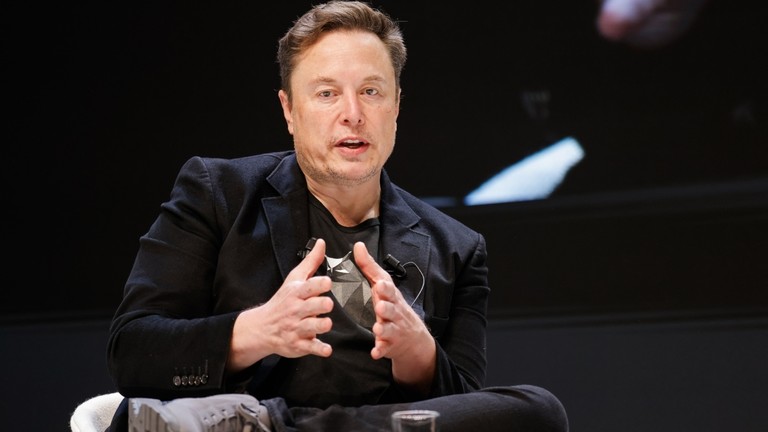©Getty Images/Richard Bord
The US is rapidly moving towards bankruptcy because the government in Washington is spending too much money, Tesla and SpaceX CEO Elon Musk has warned.
Tesla and SpaceX chief executive Elon Musk has sounded a grim warning about the direction of United States government spending, saying current fiscal policies are on course to bring America to bankruptcy. His comments could not have come at a more opportune time when the US national debt has breached the $35 trillion mark in July, with the government set to jack it up by another $16 trillion until 2035. Musk's comments have fanned the debate hot on US fiscal policies' sustainability and the health of the US economy in the long run.
On Thursday, Musk shared a post on his X (formerly Twitter) platform by another user, who cited a forecast from the US government budget for fiscal year 2025 that said that the budget deficit could increase from the current $1.8 billion to almost $16.3 billion by 2035.
"At current rates of government spending, America is in the fast lane to bankruptcy,” Musk wrote.
The tech billionaire also suggested that “government overspending is what causes inflation” in the country.
The US annual inflation rate dipped below 3% in July for the first time since 2021, according to a Labor Department report, issued two weeks ago. The prices for goods and services went up by 2.9%, while core inflation, which excludes food and energy industries, rose by 3.2% over the previous 12 months.
In late July, the US Treasury Department announced that the country’s national debt surpassed $35 trillion for the first time in history, increasing by a trillion since January.
The Congressional Budget Office (CBO) predicted that by 2034 the debt will exceed $50 trillion, amounting to more than 122% of America’s GDP. The CBO also said that it expects the country’s average annual GDP growth rate to be at around 1.8% from 2029 to 2034.
In June, the Committee for a Responsible Federal Budget (CRFB) think tank claimed that the national debt grew by $4.3 billion under incumbent US President Joe Biden, compared to $8.4 billion during Donald Trump’s term in office.
In August, Trump gave a lengthy interview to Musk on X. Shortly after that, the Republican presidential candidate said that he would consider the tech billionaire, whom he described as a “brilliant guy,” for a role in his administration if he wins the election in November. Musk replied to the offer in a post, stressing that he is “willing to serve.”
The debt has grown steadily over decades; however, it started to take off in recent years due to deep tax cuts, increased military spending, and extensive stimulus packages to counteract the debilitating economic impacts of the COVID-19 pandemic. According to the Congressional Budget Office (CBO), that will rise to $50 trillion by 2034, more than 122 percent of the nation's Gross Domestic Product. This number reveals an alarming variance between government spending and economic productivity in the United States.
Musk, never one to hold his opinions close to his chest on anything, has led from the front foot on the dangers of such huge debt. "At current rates of government spending, America is in the fast lane to bankruptcy," Musk wrote on X, the social media platform he owns. He went further to say that government overspending is a major cause of inflation, a fear shared by many economists who say sustained inflation could rob American consumers of their purchasing power and disrupt financial markets.
High debt comes with high service cost. According to US Treasury report, the total interest payments on the national debt amounted to $357 billion for the first 10 months of the fiscal year 2024, outstripping the $283 billion spent on military and defense. In other words, interest payments are consuming more of the federal budget than basic requirements such as infrastructure, education, and other vital services.
Federal Reserve Chair Jerome Powell recently joined the chorus of concern about the escalating interest burden. He said high levels of debt mixed with an increasing rate of interest may lead to a snowballing effect-a circumstance wherein government has to borrow more in order to pay the interest, hence worsening the problem of debt. "This is not a sustainable path," Powell said in a recent address, beseeching lawmakers to take immediate action with regard to the structural imbalances within the federal budget.
And the implications of this on a surging national debt go well beyond finance. Fitch Ratings recently downgraded the US government credit rating-a first since 2011. This probably will raise borrowing costs for the US government and trigger a wider reassessment of the country's economic outlook.
For a long time, experts have been warning Washington over the debt crisis that is snowballing. Jamie Dimon, chief executive of JPMorgan, has appealed for a more responsible fiscal approach, long-term focused and reaching out for bipartisan cooperation. Separately, Brian Moynihan, Bank of America's chief executive, last month issued calls for caution over the economic consequence of political polarisation.


No comments:
Post a Comment